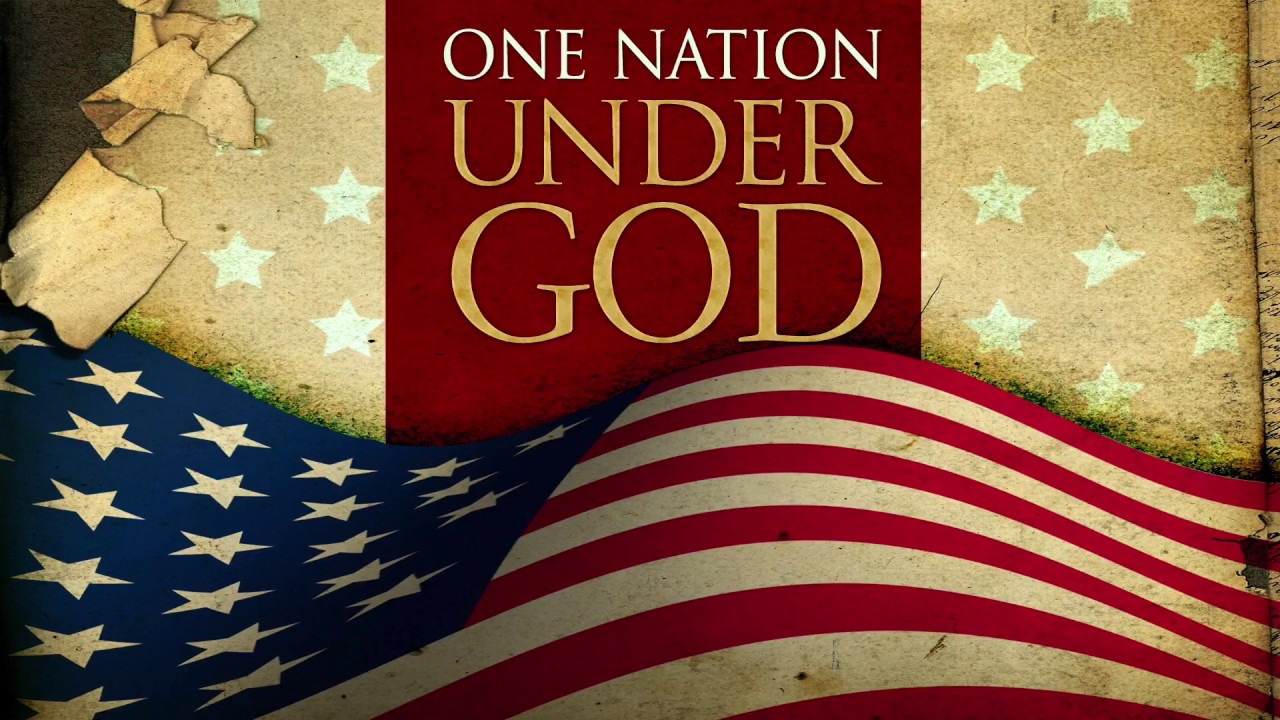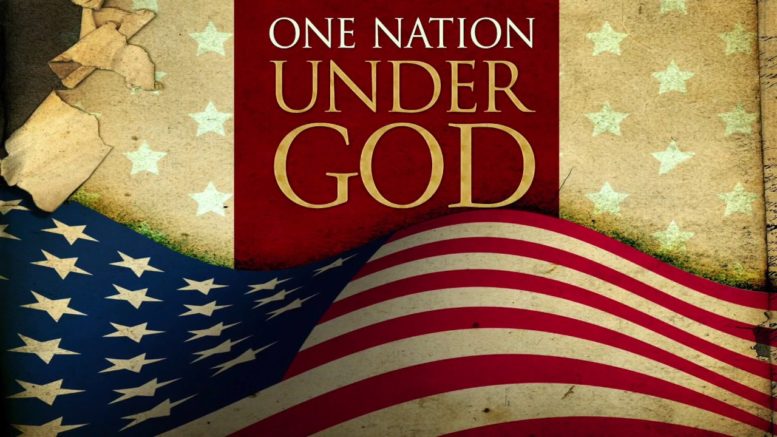
Mark Landsbaum | BARBWIRE
“I love my country.”
It was almost jarring to hear those words spoken aloud by a grown man talking to a bunch of other men. In a church no less.
But this is what it’s come to, being jarred by hearing such a thing. Why is that?
News reports tell us that millennials have virtually no sense of patriotism. We just finished eight years of a president who insisted nothing is exceptional about the United States, and traveled the globe apologizing for the U.S.A.’s alleged sins, sucking up to enemies determined to harm us and insulting friends and allies. Suddenly everything that was right had become wrong with our nation.
Anyone who follows politics should recall in 2012 when the Democratic Party’s presidential nomination convention booed a suggestion that God be mentioned favorably in the party’s platform. Let that sink in. They booed God. Unsurprisingly, the man they nominated infamously said America is not a Christian nation.
Even among conservative Protestant churches, there’s a lingering bad taste from decades of culture wars, which arguably Christian conservatives lost. Consequently, many Christians now seem resigned to ride out the trip to our nation’s oblivion, as if invoking Christian principles is fruitless or inappropriate when faced with evil and a decaying society. After all, they correctly note, we are strangers in this land, which is not our true home.
None of this is new, of course. The fundamentalist wing of Christianity about a century ago began a comfortable retreat to their pews and surrendered the culture to secular “progressives” without so much as a fight. Better, they thought, to wait for the rapture.
As a journalist for four decades, I saw animosity toward Christians and their faith accelerate. In my lifetime there was once a near-universal acceptance that the Christian worldview was the glue that held our society together. Even unbelievers acquiesced because they clearly benefitted from it. How far we’ve come. Or fallen. Today countless critics openly lambast Christians as arrogant, irrelevant, even hateful for holding the identical beliefs that once bound the culture together.
This horrific trend is why hearing someone say he loves our country seemed jarring. At our church, the Saturday following Fourth of July, a men’s breakfast featured a sing-along of a dozen or so patriotic songs. We gathered in a meeting room, down the hall from the sanctuary.
Mixing church and patriotism is problematic. I didn’t say wrong. I said problematic. Cultural changes over the past century exacerbate the problem.
Many Christians are bothered by inserting political matters into our faith. There is a good reason for that. When a pastor talks politics from the pulpit, many of us – yours truly included – believe it is inappropriate. The pulpit is where worship of God is led. When fleeting political agendas are elevated to that podium, it grates, even offends.
But politics from the pulpit is as old as American churches.
During the Revolutionary War pastor John Muhlenberg finished a sermon saying, “The Bible tells us there is a time for all things and there is a time to preach and a time to pray, but the time for me to preach has passed away, and there is a time to fight, and that time has come now.” Muhlenberg removed his preacher’s robe under which was a Virginia colonel’s uniform. He fetched his musket from behind the pulpit and immediately left for war with 300 worshippers. The British even coined a phrase to note pastors’ war-time influence: “the Presbyterian Revolt.”
More recently Martin Luther King used his title as Reverend to campaign to change racial discrimination laws. More recent still, another reverend used his pulpit to urge that “God damn America” for what the pastor told congregants were the nation’s unforgivable sins.
It’s easy to find examples of a man of the cloth politicizing the pulpit, often exceeding the boundaries of his religious calling.
For these reasons – questionable and nebulous political activism and haughty presumptions that God must agree with a particular political viewpoint – it’s understandable many believers resist mixing church and politics.
At the other end of the spectrum, it’s also easy to make a case that Christians’ withdrawal from confronting cultural evil and sin has accelerated the growth of both. If presumed safety within church walls was their motive, many are being rudely disappointed.
Government invoking godless secularism and the ravages of hedonism now threaten Christian pastors in California with jail if they dare tell homosexual sinners they can and should repent. Catholic churches are ordered against their religious convictions to perform abortions or lose government funding. Believing bakers, photographers and florists have narrowly escaped ruination (for now) for refusing to participate in same-sex “marriage” ceremonies. Too often the church has been silent as these and innumerable other infringements battered Christendom. Playing by the world’s rules, Christians have attempted practical or compromising rebuttals when they should have been citing the Bible.
If God intended his church to surrender to the culture, why are 66 books of the Bible replete with instructions for changing men’s lives, which for millennia consequently definitely did change the cultures in which they lived?
That brings us to the sing-along at church, featuring such rousing tunes as “The Marine Hymn” and “My Country Tis of Thee,” among others. It’s understandable that a Christian worship service should not include a song that proclaims, “Off we go into the wild blue yonder…At ‘em boys, give ‘em the gun…”
And even the folk song “This Land is Your Land,” as heart-warming as it truly is, probably theologically presumes too much by declaring “…this land is made for you and me…” American Indians have disputed that point for centuries. How many who sing that song realize Woody Guthrie wrote it as a sarcastic retort to “God Bless America” because he was sick of hearing Kate Smith sing the Irving Berlin song on the radio. How many admirers of “This Land…” know that Guthrie spent two years writing for the godless Communist Party’s newspaper “Peoples’ World.” Did I mention mixing church and politics can be problematic?
Don’t get me wrong. Each of Saturday’s tunes, which included anthems of each military branch as well as “The Star-Spangled Banner,” are worthy to be sung. They commemorate people and ideals that sadly are valued too little today.
But there is inherent danger incorporating such sentiments in worship, which no doubt is why we gathered on Saturday in a meeting room, rather than on Sunday in the sanctuary.
To emphasize the point, consider the ever-popular “Battle Hymn of the Republic,” which also was on Saturday’s song list. It is truly a stirring song. But I cringe when reflecting on the lyrics and the knowledge that the author was not a Christian at all, but a Unitarian Universalist. How ironic that Julia Ward Howe wrote this “hymn” calling for God’s wrath to be delivered on half our nation for essentially only wanting to be left alone. There are some, including yours truly, who regard the Civil War as the War of Northern Aggression, waged by an unashamed white supremist president, who admitted aloud that he didn’t care to abolish slavery if it meant he could keep the South and its cotton industry from leaving the union.
But even Lincoln didn’t have the audacity to invoke the book of Revelation to justify his bloody cause, as Howe did. Indeed, Lincoln had the presence of mind to say, “…my concern is not whether God is on our side; my greatest concern is to be on God’s side, for God is always right.”
Mixing politics and religion is problematic indeed. But to reiterate, it’s not wrong.
Those who would banish political considerations from expressions of their faith would relegate God’s law to relic status. The founders, whose courageous efforts gave birth to our nation 242 years ago, understood that it is God who grants us what amount to political rights because “all men are created equal…endowed by their Creator with certain unalienable Rights…”
But when the culture expels God and banishes His people to the faux safety of their pews, we lose sight that ours is the only nation founded on a creed, as a man of faith once explained. As such, we have an obligation when “we the people” determine how to govern ourselves to insure that our laws don’t conflict with God’s laws. When they do, we sin. Individually and corporately. Of course, secularists complain that basing laws on the Bible improperly mixes religion and politics.
It may be instructive that one quote recited at our Saturday sing-along was Benjamin Franklin’s: “…God governs in the Affairs of Men…We have been assured, Sir, in the Sacred Writings, that except the Lord build the House they labor in vain who build it.”
That’s something to sing about.
Like Howe, Franklin also was not a Christian, at best a deist. Nevertheless, he enjoyed that common bond of values and precepts of a Christian worldview shared in his day by believers and unbelievers alike. Unlike today.
Yours truly is encouraged that Christian men so willingly and enthusiastically gathered at our church to sing patriotic songs to commemorate our nation’s fight for independence. It’s even more encouraging that politicians of all stripes are invoking the Bible and Jesus when making political arguments.
Someone once remarked that everything is political. I suggest everything is religious. Those who think they can leave their Christian faith in the pews when they enter the world need only look at the last century to understand how that turns out. In political matters we should argue for what is right and argue against what is wrong. How does a Christian do that without invoking his faith? When our nation follows Christian precepts, it absolutely is reason to sing.
I’m already looking forward to next year’s Fourth of July sing-along at church – but not in church – because that seems to be a prudent restraint and dividing line. As one of our Saturday songs put it, “America! America! God shed his grace on thee…America! America! God mend thine every flaw.”
SOURCE: BARBWIRE
Mark Landsbaum
Mark Landsbaum is a Christian husband, father, grandfather and journalist who has written for a living for 43 years, ever since discovering he had no particular talents. He can be found on Facebook, Linkedin, and in the archives of the Orange County Register where he wrote another column for 10 years. He can be reached at Mark.Landsbaum@gmail.com





